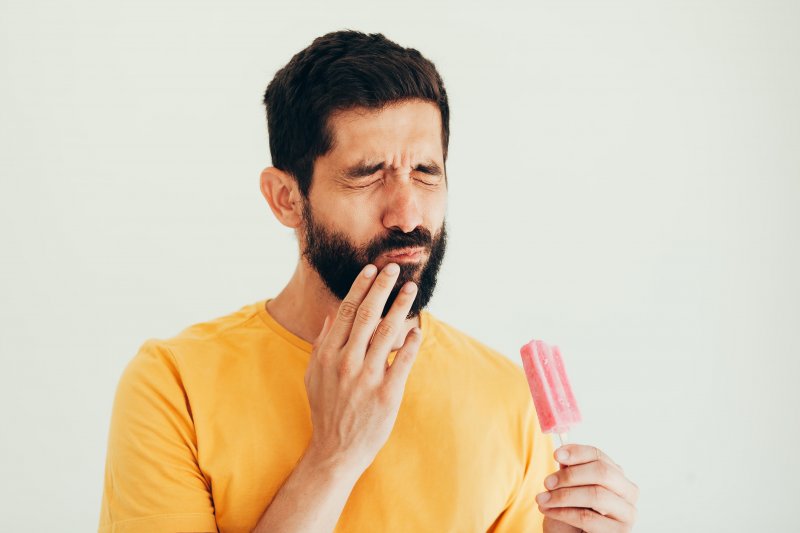Does Dental Sensitivity Require Emergency Care?
March 3, 2022

It’s a warm and sunny day and you’re in the mood for ice cream—you treat yourself to a double-scooped cone and sit down on a bench to enjoy it. You can’t help yourself and immediately take a large bite out of the upper scoop. A few seconds later, a tingling, icy-hot sensation floods your whole mouth, and you can’t stand the thought of taking another bite. Dental sensitivity isn’t uncommon, and many people suffer from it, but is it something that requires emergency care?
What Causes Dental Sensitivity?
If eating ice cream or sipping hot coffee seems to send your mouth into a sensory overload, or if brushing and flossing sometimes makes you wince in pain, you might have sensitive teeth. This can be caused by many things, including tooth decay (cavities), fractured teeth, eroded fillings, gum disease, worn tooth enamel, or an exposed tooth root.
Healthy teeth have a layer of enamel that protects the crown, which is the part above the gum line. But down underneath the enamel is a layer of dentin, which helps to preserve and regulate the nerves and cells inside of your teeth. When this layer of dentin becomes exposed, hypersensitivity can become a major issue.
Is Dental Sensitivity an Emergency?
If you’re suffering from dental sensitivity, you should contact your dentist, especially if you’re in lasting discomfort or pain, or if the sensitivity is impacting one or two teeth at a time (this is usually indicative of a serious problem). If the sensitivity is mostly short-lived, and only occurs when something hot or cold touches your teeth, it’s not really an emergency; however, if the sensation continues to last for 20 or more seconds, you should act relatively quickly. Your dentist will be able to investigate and determine what’s causing the hypersensitivity and provide you with a solution. Be sure to consult with them—if left untreated, it can escalate and turn into a true emergency.
How Can I Treat Dental Sensitivity?
Since it is a common issue, there are many ways to treat sensitive teeth; although it will also depend on what is causing the sensitivity. Some treatments include desensitizing toothpaste, fluoride gel, a crown, inlay, or bonding. In more serious cases, a surgical gum graft or root canal therapy can be a possible solution.
There are also minor ways to alleviate symptoms prior to receiving treatment, including drinking lukewarm water, avoiding hot, cold, spicy, or overly sweet foods, and taking painkillers like Ibuprofen as needed.
Sensitive teeth can do a lot to disrupt you, but it’s an issue that can certainly be remedied by your dentist. With a little help, you’ll be back to enjoying ice cream in no time.
About the Author
Dr. Joseph Noble, originally from San Antonio, has been practicing dentistry for over 20 years. He greatly enjoys caring for his patients, their families, and being a part of their lives. He received his DDS from the University of Texas Health Science Center at San Antonio and is a proud member of the American Dental Association, the Texas Dental Association, and the San Antonio District Dental Society. If you have any questions about dental sensitivity or would like to contact Dr. Noble, he can be reached at his website or (210) 342-1001.
No Comments
No comments yet.
RSS feed for comments on this post.
Sorry, the comment form is closed at this time.

